You Have Nutrition Gaps – Grüns: A Comprehensive Solution for Modern Wellness
In today’s fast-paced world, maintaining a balanced and nutritious diet can feel like an uphill battle. Despite our best intentions, the demands of work, family, and everyday life often leave us reaching for quick, convenient meals that lack essential nutrients.
As a result, many of us face significant nutritional gaps—deficiencies in the vitamins, minerals, and other vital components our bodies need to thrive. Enter Grüns, an innovative solution designed to bridge these gaps and promote holistic wellness.

Nutrition Gaps Grüns is not just another dietary supplement; it’s a thoughtfully crafted product that combines cutting-edge nutritional science with natural, plant-based ingredients. It offers a convenient, effective, and sustainable way to address your body’s unique nutritional needs. Whether you’re an athlete, a busy professional, or someone striving to lead a healthier life, Grüns can help you close the gaps in your diet and unlock your full potential.
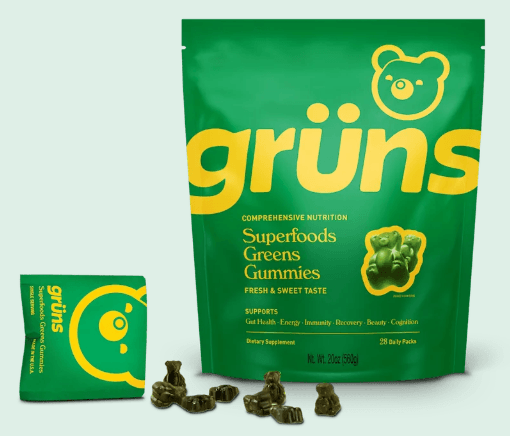
What Are Nutrition Gaps?
Nutritional gaps occur when the foods we eat fail to provide all the nutrients our bodies require for optimal health. While most people think of malnutrition as a condition associated with insufficient calorie intake, nutritional gaps are a more nuanced issue. They can exist even in individuals who consume enough calories but lack essential nutrients like vitamins, minerals, fiber, and antioxidants.
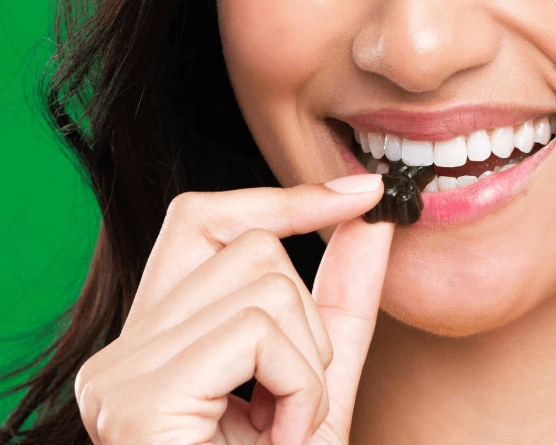
Some common causes of nutritional gaps include: Poor Diet Choices: Highly processed and fast foods are often low in nutrients and high in empty calories, leading to deficiencies in essential vitamins and minerals.
Modern Farming Practices: Over time, soil depletion has reduced the nutrient content of fruits, vegetables, and grains, making it harder to obtain sufficient nutrition even from fresh produce.
Busy Lifestyles: Many people skip meals, eat on the go, or rely on convenience foods that lack balanced nutrition.
Special Dietary Needs: Vegan, vegetarian, and gluten-free diets, while beneficial in many ways, can sometimes result in nutrient deficiencies if not carefully planned.
Aging: As we age, our bodies become less efficient at absorbing nutrients from food, increasing the likelihood of deficiencies.
Regardless of the cause, nutritional gaps can have serious consequences for your health. Symptoms may include fatigue, weakened immunity, poor concentration, and long-term risks like osteoporosis, heart disease, and diabetes.
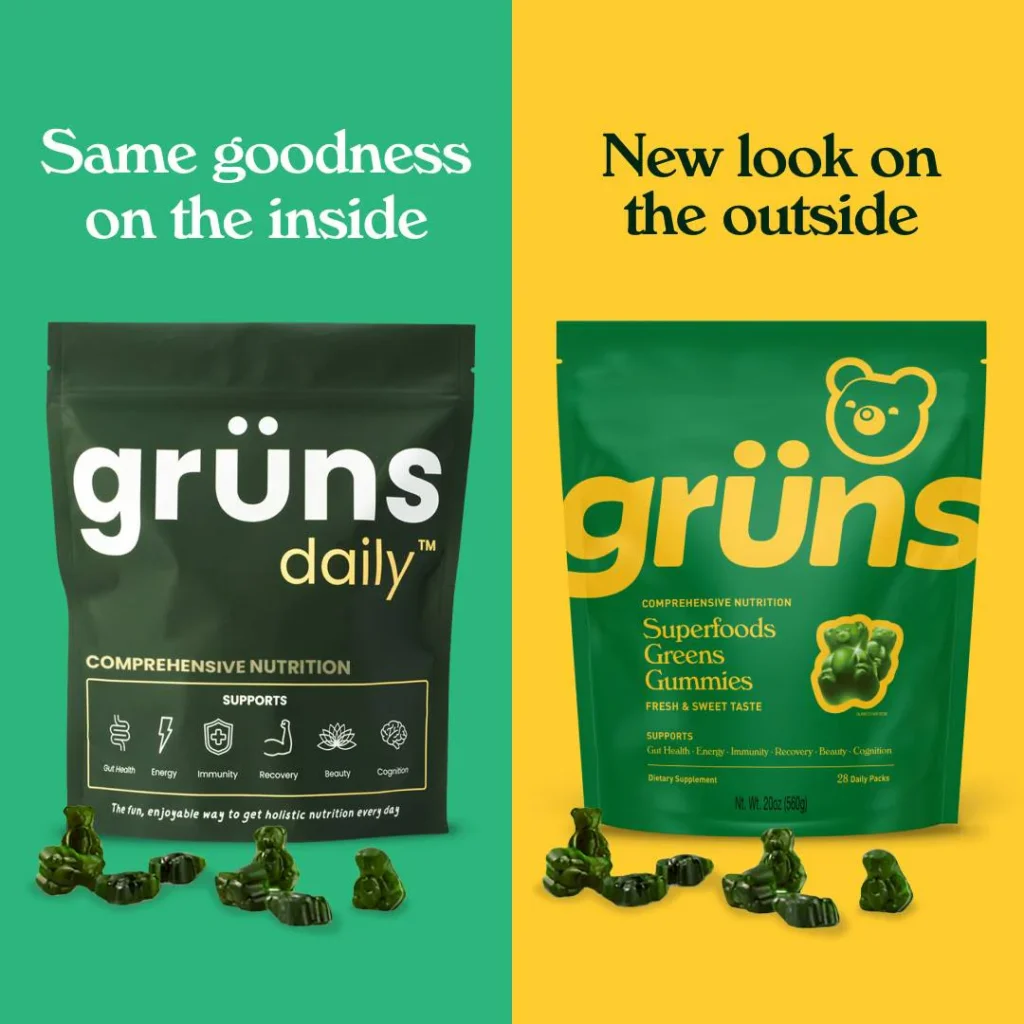
Grüns recognizes these challenges and provides an easy, reliable way to supplement your diet with the nutrients you need, ensuring your body operates at its best.
What Makes Grüns Unique?
Grüns stands out in the crowded world of supplements for several reasons. Its formula, philosophy, and delivery methods are all designed with one goal in mind: to help you achieve optimal health in a sustainable and accessible way.
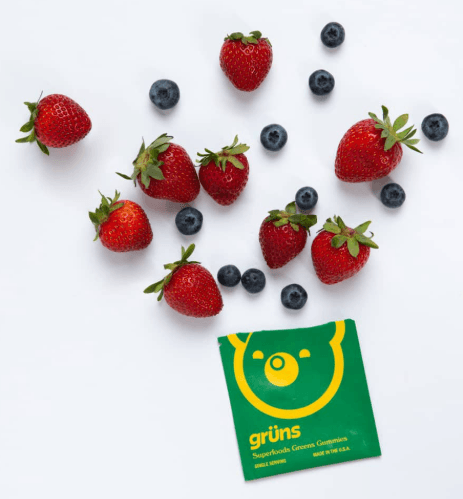
- Plant-Based and Natural Ingredients
Grüns sources its ingredients from high-quality, plant-based materials. This ensures the product is vegan-friendly and free from harmful additives, artificial colors, and synthetic preservatives. Its ingredients are chosen not only for their nutrient density but also for their bioavailability—how easily your body can absorb and use them. - Comprehensive Nutrient Profile
Grüns offers a broad spectrum of essential nutrients, including:

Vitamins: A, C, D, E, and a full complement of B vitamins to support energy production, immune function, and brain health.
Minerals: Calcium, magnesium, zinc, and selenium to strengthen bones, support muscle function, and protect against oxidative stress.
Phytonutrients: Derived from superfoods like spirulina, chlorella, and wheatgrass, these compounds provide antioxidant and anti-inflammatory benefits.
Fiber and Prebiotics: Essential for digestive health and gut microbiome balance.
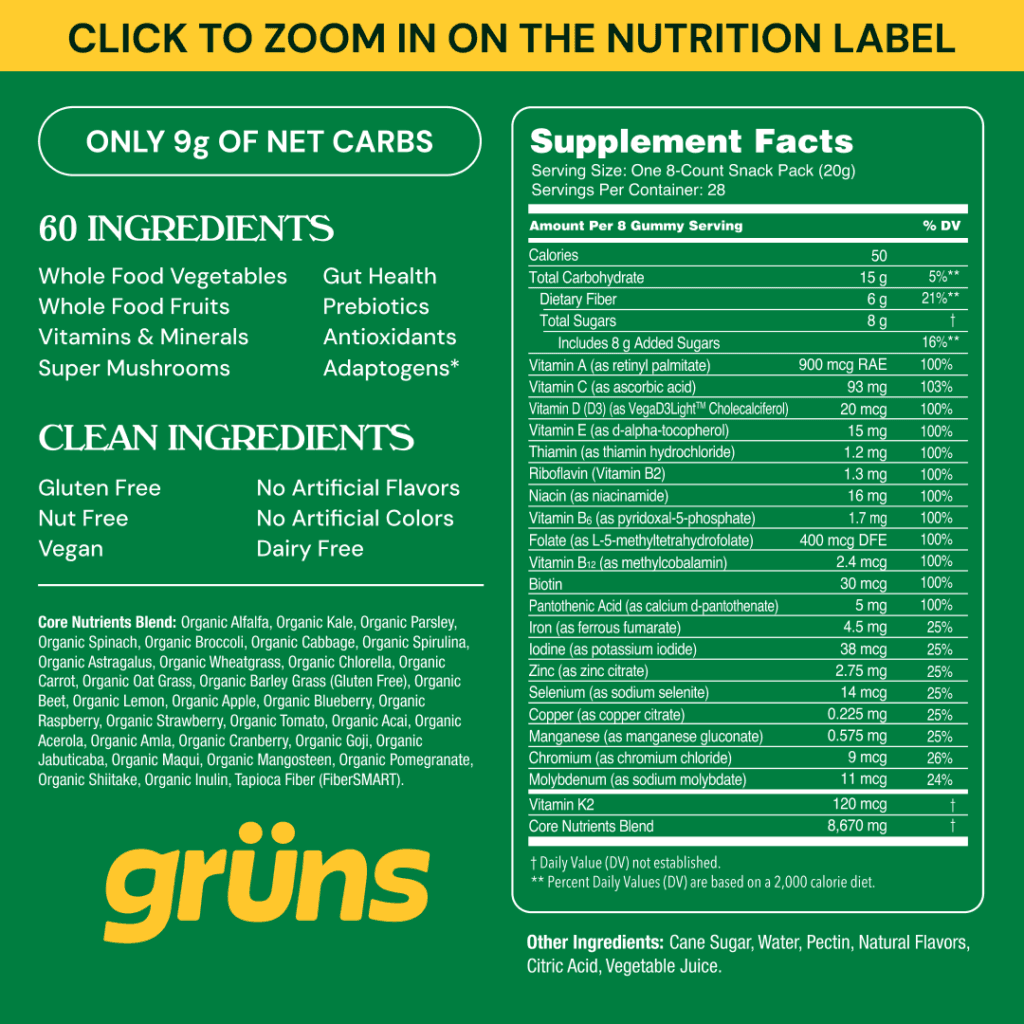
- Holistic Health Benefits
Unlike single-nutrient supplements, Grüns is designed to support multiple aspects of your health simultaneously:
Energy and Vitality: With its blend of B vitamins and iron, Grüns combats fatigue and boosts stamina.
Immune Support: Antioxidants like vitamin C, zinc, and selenium strengthen your body’s natural defenses.
Cognitive Function: Grüns includes nutrients like omega-3 fatty acids and magnesium to enhance focus, memory, and mental clarity.
Digestive Health: The fiber and prebiotics in Grüns promote a healthy gut microbiome, which is key to overall wellness.
- Convenient and Versatile
Grüns is available in multiple formats to suit your lifestyle, including powders, capsules, and ready-to-drink beverages. The powdered form can be easily added to smoothies, juices, or water, making it a quick and effortless way to boost your nutrition. - Eco-Friendly and Sustainable
Grüns is committed to environmental sustainability. Its packaging is made from recyclable materials, and the company prioritizes ethical sourcing practices to minimize its ecological footprint.
Who Can Benefit From Grüns?
Grüns is suitable for virtually everyone, regardless of age, gender, or lifestyle. Here are just a few examples of people who can benefit from incorporating Grüns into their daily routines:
Busy Professionals
If you’re constantly on the go, it can be challenging to prepare nutritious meals. Grüns provides a convenient way to ensure you’re meeting your nutritional needs, even on the busiest days.
Athletes and Fitness Enthusiasts
Athletes have higher nutrient demands due to the physical stress of training and recovery. Grüns delivers the vitamins, minerals, and antioxidants needed to support performance and muscle repair.
Vegans and Vegetarians
Plant-based diets are healthy but can sometimes lack key nutrients like vitamin B12, iron, and omega-3 fatty acids. Grüns fills these gaps without compromising your dietary choices.
Older Adults
As we age, our nutritional needs change. Grüns helps older adults maintain strong bones, a robust immune system, and cognitive function.
Anyone Looking to Improve Their Health
Even if you don’t have specific dietary restrictions or health concerns, Grüns can enhance your overall well-being by providing a steady supply of essential nutrients.
The Science Behind Grüns
Grüns is backed by rigorous scientific research and formulated by a team of nutritionists, dietitians, and food scientists. Each ingredient is carefully selected based on its proven health benefits, and the product undergoes stringent quality testing to ensure safety and efficacy.
Bioavailability
One of the key focuses of Grüns is maximizing bioavailability. Many supplements deliver nutrients in forms that are difficult for the body to absorb. Grüns uses advanced formulations to ensure the nutrients are readily available and utilized by your cells.
Synergistic Formulation
The ingredients in Grüns are not just combined randomly; they are carefully chosen to work synergistically. For example, vitamin D enhances calcium absorption, and vitamin C boosts the effectiveness of iron. This thoughtful pairing ensures you get the maximum benefit from each serving.
How to Incorporate Grüns Into Your Routine
Adding Grüns to your daily routine is simple and flexible. Here are some tips to get started:
Choose Your Format: Decide whether you prefer the powdered version, capsules, or ready-to-drink options.
Follow the Recommended Dosage: Start with the suggested serving size and adjust as needed based on your lifestyle and health goals.
Experiment with Recipes: Mix Grüns into smoothies, yogurt, oatmeal, or even baked goods for a nutrient boost.
Be Consistent: For the best results, incorporate Grüns into your routine consistently, making it a part of your daily habits.
Testimonials and Success Stories
Grüns has transformed the lives of thousands of users worldwide. Here’s what some of them have to say:
Sarah, 34: “As a busy mom, I rarely have time to focus on my own nutrition. Grüns has been a game-changer—it’s quick, easy, and makes me feel amazing.”
James, 42: “I started using Grüns after feeling constantly tired. Within weeks, my energy levels skyrocketed, and I noticed a huge improvement in my workouts.”
Emily, 29: “As a vegan, I struggled to get enough B12 and iron. Grüns has filled those gaps and helped me feel more balanced and energetic.”
Final Thoughts
Nutritional gaps are a common but solvable challenge in modern life. Grüns offers an all-in-one solution that empowers you to take control of your health with ease and confidence. With its plant-based ingredients, comprehensive nutrient profile, and commitment to sustainability, Grüns is more than a supplement—it’s a lifestyle upgrade.
Whether you’re looking to boost your energy, support your immune system, or simply ensure your body gets the nutrients it needs, Grüns is here to help.
Start your journey toward better health today and experience the transformative power of closing your nutritional gaps with Grüns.
Understanding Nutrition Gaps: Causes, Consequences, and Solutions
In a world where information about health and wellness is more accessible than ever, the concept of nutrition gaps remains a pressing concern. Nutrition gaps refer to the discrepancies between the nutrients an individual consumes and the nutrients they require for optimal health.
These gaps can result from various factors, including poor dietary choices, socio-economic constraints, or even misconceptions about what constitutes a healthy diet.
Addressing these gaps is crucial, as they can lead to a cascade of health issues, ranging from nutrient deficiencies to chronic diseases. In this comprehensive exploration, we delve into the causes, consequences, and strategies for bridging nutrition gaps.
Causes of Nutrition Gaps
1. Poor Dietary Habits
Modern lifestyles often prioritize convenience over nutrition. The rise of processed foods, fast food chains, and sugary beverages has led to diets that are calorie-dense but nutrient-poor. These dietary patterns often lack essential vitamins, minerals, and other nutrients required for bodily functions.
2. Limited Access to Nutritious Foods
Socio-economic factors play a significant role in creating nutrition gaps. Food deserts—areas where access to affordable, healthy food is limited—are a glaring example. In these regions, people may rely on cheap, processed foods, which are often devoid of essential nutrients.
3. Lack of Nutritional Education
Misconceptions about what constitutes a balanced diet contribute significantly to nutrition gaps. Many people are unaware of the nutritional value of different food groups or the importance of portion control. Marketing and misinformation further exacerbate this issue, leading individuals to make suboptimal food choices.
4. Age-Related Factors
Nutritional needs change with age. For instance, children and adolescents require more calcium and vitamin D for bone development, while older adults need higher levels of certain nutrients like vitamin B12 and fiber. Failing to adjust dietary intake to meet these changing needs can result in deficiencies.
5. Health Conditions
Certain medical conditions can impair the body’s ability to absorb nutrients. For example, individuals with celiac disease, Crohn’s disease, or irritable bowel syndrome (IBS) may struggle with malabsorption of vital nutrients, even if their diets are otherwise balanced.
6. Environmental and Lifestyle Factors
Stress, lack of sleep, and high levels of physical activity can increase the body’s nutrient demands. Additionally, environmental factors like pollution can interfere with nutrient absorption or increase the body’s need for antioxidants.
Consequences of Nutrition Gaps
Nutrition gaps have far-reaching implications for both individual and public health. These consequences can manifest in various forms:
1. Nutrient Deficiencies
When the body does not receive adequate nutrients, deficiencies can occur. Common examples include iron deficiency anemia, vitamin D deficiency, and calcium deficiency. These conditions can lead to symptoms like fatigue, weakened immunity, and poor bone health.
2. Impaired Physical and Cognitive Development
In children, nutrition gaps can hinder growth and cognitive development. For instance, insufficient intake of omega-3 fatty acids is linked to poor brain development, while a lack of iron can affect attention and learning abilities.
3. Increased Risk of Chronic Diseases
A diet lacking in essential nutrients can increase the risk of chronic diseases such as diabetes, cardiovascular diseases, and certain types of cancer. For example, insufficient fiber intake is associated with a higher risk of gastrointestinal disorders and colorectal cancer.
4. Weakened Immune System
Nutrients like zinc, vitamin C, and vitamin A play pivotal roles in maintaining a robust immune system. Deficiencies in these nutrients can make individuals more susceptible to infections and slow recovery rates.
5. Reduced Quality of Life
Long-term nutritional inadequacies can lead to decreased energy levels, poor mental health, and an overall reduction in quality of life. Individuals may experience mood swings, irritability, or even depression due to nutrient imbalances.
Bridging Nutrition Gaps
Addressing nutrition gaps requires a multifaceted approach that encompasses education, accessibility, and behavioral changes. Below are some strategies to bridge these gaps effectively:
1. Dietary Diversification
Encouraging the consumption of a wide variety of foods is one of the most effective ways to address nutrition gaps. A balanced diet should include fruits, vegetables, whole grains, lean proteins, and healthy fats. Incorporating diverse food sources ensures a broad spectrum of nutrients.
2. Nutritional Education
Raising awareness about the importance of nutrition is crucial. Public health campaigns, school programs, and community workshops can educate individuals about balanced diets, portion control, and reading food labels. Tailored education for specific demographics, such as pregnant women or athletes, can address unique nutritional needs.
3. Fortified Foods
Fortification involves adding essential nutrients to commonly consumed foods. For example, many countries fortify flour with iron and folic acid to prevent anemia and neural tube defects. Similarly, iodized salt has been instrumental in reducing iodine deficiency globally.
4. Dietary Supplements
In cases where dietary intake alone cannot meet nutritional needs, supplements can play a vital role. For instance, vitamin D supplements are recommended for individuals with limited sun exposure, and iron supplements may be prescribed for those with anemia. However, supplements should be used judiciously and under professional guidance.
5. Improving Food Accessibility
Governments and organizations can work to eliminate food deserts by increasing the availability of fresh, nutritious foods in underserved areas. Initiatives like farmers’ markets, community gardens, and subsidies for healthy food options can make a significant impact.
6. Personalized Nutrition Plans
Acknowledging that each individual’s nutritional needs are unique is essential. Personalized nutrition plans, guided by dietitians or nutritionists, can help address specific gaps based on age, health status, and lifestyle.
7. Technological Innovations
Technology can aid in closing nutrition gaps. Mobile apps that track dietary intake, wearable devices that monitor physical activity, and online platforms offering personalized meal plans are becoming increasingly popular. These tools can empower individuals to make informed dietary choices.
Role of Stakeholders in Addressing Nutrition Gaps
The responsibility of bridging nutrition gaps does not lie solely with individuals. Various stakeholders, including governments, healthcare providers, educators, and the food industry, have vital roles to play:
- Governments can implement policies to promote healthy eating, regulate food labeling, and subsidize nutritious foods.
- Healthcare providers can screen for nutritional deficiencies during routine check-ups and provide tailored advice.
- Educators can incorporate nutrition education into school curriculums, teaching children the importance of healthy eating from an early age.
- The food industry can reformulate products to reduce added sugars, unhealthy fats, and sodium while increasing nutrient density.
Monitoring Progress
To effectively bridge nutrition gaps, it is essential to monitor progress through regular assessments. Population-wide surveys and health screenings can identify prevalent deficiencies and track improvements over time. Data-driven approaches allow for targeted interventions and resource allocation.
Conclusion
Nutrition gaps are a complex but solvable problem. By understanding their causes and consequences, society can take proactive steps to ensure that everyone has access to the nutrients they need for a healthy and fulfilling life.
From promoting dietary diversification to leveraging technological innovations, the strategies to bridge these gaps are within reach. Collaborative efforts among individuals, communities, and stakeholders are essential to create a world where nutrition gaps are a thing of the past.
As awareness grows and resources are mobilized, the vision of a well-nourished global population becomes increasingly attainable.
Top 5 Nutritional Components for Optimal Health
Maintaining a balanced diet is essential for overall well-being, and certain nutrients play a pivotal role in supporting bodily functions. Here are the top five nutritional components crucial for health:
- Protein: Essential for building and repairing tissues, proteins are the building blocks of muscles, enzymes, and hormones. Include sources like lean meats, fish, beans, and nuts.
- Carbohydrates: The body’s primary energy source, carbohydrates fuel daily activities. Opt for complex carbs like whole grains, fruits, and vegetables for sustained energy.
- Healthy Fats: Unsaturated fats from avocados, nuts, and olive oil promote heart health and brain function while providing energy.
- Vitamins and Minerals: Vital for immunity and metabolic processes, ensure adequate intake of vitamins (like C and D) and minerals (like calcium and iron).
- Fiber: Found in fruits, vegetables, and whole grains, fiber supports digestion and helps prevent chronic diseases like diabetes.


1 comment
Please share your question. Thank you!